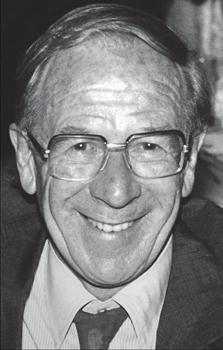Derrick Rowley
Eminent researcher and Emeritus Professor of Microbibiology and Immunology at the University of Adelaide, Derrick Rowley, studied for his BSc (Hons) Chemistry at Bradford Technical College from 1938 to 1941.
 Derrick was a working class lad whose outstanding
abilities enabled him to enjoy an excellent education,
winning scholarships to Bradford Grammar School
and then Bradford Technical College, where after 3
years studying he graduated with First Class Honours
in his external London degree.
Derrick was a working class lad whose outstanding
abilities enabled him to enjoy an excellent education,
winning scholarships to Bradford Grammar School
and then Bradford Technical College, where after 3
years studying he graduated with First Class Honours
in his external London degree.
He then worked
in petrochemical research, based in Manchester,
London and Orpington. On completion of his PhD he
seemed set for a successful career within the chemical
industries until he took a completely different direction,
which demanded great commitment from him but
ultimately benefited many.
Derrick had spent some time at the Glaxo Laboratories
during his spell in London and his encounter there
with Sir Alexander Fleming prompted him to work
part-time for the illustrious discoverer of penicillin at St
Mary’s Hospital and to study medicine. He qualified in
1950 and received a Harkness Fellowship to undertake
research in America. On his return he was made Head
of the Department of Bacterial Chemistry at the
Wright Fleming Institute in London.
He left London in 1960 to become Chair of
Microbiology at the University of Adelaide, remaining
there 28 years. He increased the size and scope of
the Department, which later became the Department
of Microbiology & Immunology, enormously. During
his service at the University he also spent 3 years
as Dean of the Faculty of Medicine. Derrick was
founder and first President of the Australian Society
for Immunology, edited the Australian Journal of
Experimental Biology and Medical Science (later
Immunology and Cell Biology) and was a member of
the National Health & Medical Research Council.
He gained an international reputation for his
significant research into in enteric infections and
the bacterial causes of their spread and he used this
expert knowledge in a number of advisory roles for
the World Health Organization (WHO). He chaired the
WHO Committee of Diarrhoeal Disease Research and
the Scientific Program Committee of the International
Centre of Diarrhoeal Diseases Research in Bangladesh.
When Derrick retired from the University of Adelaide
in 1988, he became Chairman of Council of the Child
Health Research Institute; helped establish and acted
as part-time Research Director at Enterovax Research
Pty Ltd, which used the latest DNA technology to
develop vaccines against enteric diseases; and worked
as Research Director/Adviser at the Queen Elizabeth
Hospital. He was also a consultant and advisor on
various charitable projects seeking to improve the
health of Tibetan refugees in India. His immense
contributions to immunology were recognised in 1993
when Derrick was made a member of the Order of
Australia.
Derrick died in 2004 but his legacy lives on in the
important work done by the substantial number of
researchers who he encouraged.
Photograph courtesy of the University of Adelaide